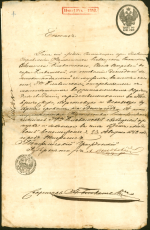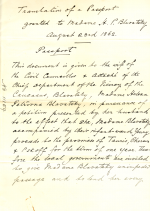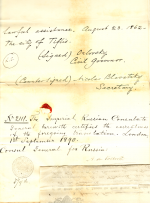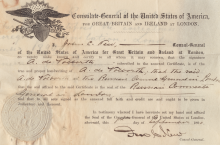Yuri
UNDER CONSTRUCTION
UNDER CONSTRUCTION
Yuri or Youri was the ward of Helena Petrovna Blavatsky and her husband Nikofor Blavatsky. He was born in 1858 and died in 1867.[1]
Various accounts have been made of Yuri, based on few facts. It is possible that he was the child of Italian opera singer Agardi Metrovich and his wife, who were close friends of HPB and her family. Spurious stories passed around in HPB's lifetime that Yuri was the love-child of an affair with Metrovich or with Baron Meyendorf, which she vigorously denied.
Blavatsky accounts of Yuri
A. P. Sinnett asked Helena Petrovna Blavatsky for details of her life that could be included in a book of memoirs, in an effort to improve public opinion of her in the midst of the Hodgson Report scandal. She was accused of being the paramour of Agardi Metrovich and of Baron Meyendorf, and of having a child Yuri out of wedlock, in addition to the charges by the Society for Psychical Research that she committed fraud and forgery. She responded to Sinnett:
I will try to do what I can to enliven the narrative in the Memoirs, because I promised I would, and mean to keep to my promise, however disagreeable it may be for me personally....
You say, "Thus, for example, we must bring in the whole of that Metrovitch incident." I say we must not. These Memoirs will not bring my vindication. This I know as well as I knew that The Times would not notice my letter against Hodgson's Report. Not only will they fail to do so, "if they are made sufficiently complete," but if they appeared in six volumes and ten times as interesting — they will never vindicate me; simply because "Metrovitch" is only one of the many incidents that the enemy throws at my head. If I touch this "incident" and vindicate myself fully, a Solovioff, or some other blackguard will bring out the Meyendorf and "the three children incident." And if I were to publish his [Meyendorf's] letters (in Olcott's possession) addressed to his "darling Nathalie" in which he speaks of her raven black hair "Longs comme un beau manteau de roi," — as de Musset expresses it of his Marquesa d'Amedi's hair — then I would be simply dealing a slap on the face of a dead martyr [Metrovich], and call forth the convenient shadow of someone else from the long gallery of my supposed lovers. Now why should I bring out Metrovitch? Suppose I said the whole truth about him? What is it? Well, I knew the man in 1850, over whose apparently dead corpse I stumbled over in Pera, at Constantinople, as I was returning home one night from Bougakdira to Missire's hotel. He had received three good stabs in his back from one, or two, or more Maltese ruffians, and a Corsican, who were paid for it by the Jesuits. I had him picked up, after standing over his still breathing corpse for about four hours, before my guide could get mouches to pick him up. The only Turkish policeman meanwhile who chanced to come up asking for a baksheesh and offering to roll the supposed corpse into a neighbouring ditch, then showing a decided attraction to my own rings and bolting only when he saw my revolver pointing at him. Remember, it was in 1850, and in Turkey. Then I had the man carried to a Greek hotel over the way, where he was recognised and taken sufficiently care of, to come back to life. On the next day he asked me to write to his wife and Sophie Cruvelli (the Duchess's dear friend now Vicomtesse de Vigier at Nice and Paris, and at the time his mistress; No. 1 scandal). I wrote to his wife and did not to the Cruvelli. The former arrived from Smyrna where she was, and we became friends.
I lost sight of them after that for several years and met him again at Florence, where he was singing at the Pergola, with his wife. He was a Carbonaro, a revolutionist of the worst kind, a fanatical rebel, a Hungarian, from Metrovitz, the name of which town he took as a nom de guerre. He was the natural son of the Duke of Lucea, as I believe, who brought him up. He hated the priests, fought in all the rebellions, and escaped hanging by the Austrians, only because — well, if s something I need not be talking about. Then I found him again in Tiflis in 1861, again with his wife, who died after I had left in 1865 I believe; then my relatives knew him well and he was friends with my cousins Witte.
Then, when I took the poor child [Yuri] to Bologna to see if I could save him I met him again in Italy and he did all he could for me, more than a brother. Then the child died; and as it had no papers, nor documents and I did not care to give my name in food to the kind gossips, it was he, Metrovitch who undertook all the job, who buried the aristocratic Baron's child — under his, Metrovitch's name saying "he did not care," in a small town of Southern Russia in 1867. After this, without notifying my relatives of my having returned to Russia to bring back the unfortunate little boy whom I did not succeed to bring back alive to the governess chosen for him by the Baron, I simply wrote to the child's father to notify him of this pleasant occurrence for him and returned to Italy with the same passport. Then comes Venice, Florence, Mentana. The Garibaldis (the sons) are alone to know the whole truth; and a few more Garibaldians with them. What I did, you know partially; you do not know all. My relatives do, my sister does not, and therefore and very luckily Solovioff does not.
Now, shall I, in the illusive hope of justifying myself, begin by exhuming these several corpses — the child's mother, Metrovitch, his wife, the poor child himself, and all the rest? NEVER It would be as mean, and sacrilegious as it would be useless. Let the dead sleep, I say.[2]
Madame Blavatsky here implies that Baron Meyendorf was the natural father of Yuri ("The aristocratic Baron's child"), that the child's mother ("Nathalie") was known to her, and that her friend Metrovich arranged for the burial after the child died before it could be returned "to the governess chosen for him by the Baron."
1862 Passport

In 1862 a Russian passport was issued, at the request of her husband, for Madame Blavatsky and "their infant-ward Youry" to travel in Ukraine and in northwest Russia. A translation of the Russian document into English was made by the Russian Consul-General in London, with his signature certified by the Consul-General of the United States. The original document, translation, and certificate are in the archives of the Theosophical Society with international headquarters in Pasadena, California, and we are grateful that scans of those documents have been made available. These documents with another translation may also be seen at Teopedia.


Transcription of passport
This document is given to the wife of the Civil Councillor & Attaché of the Chief Department of the Viceroy of the Caucasus, Blavatsky, Madame Helena Petrovna Blavatsky, in pursuance of a petition presented by her husband to the effect that she, Madame Blavatsky, accompanied by their infant-ward Youry, proceeds to the provinces of Tauris, Cherson & Pskoff for the term of one year. Therefore the local governments are invited to give Madame Blavatsky unimpeded passage and to lend her every lawful assistance. August 23. 1862 – The city of Tiflis.
No 2111. The Imperial Russian Consulate General herewith certifies the correctness of the foregoing translation. London, 1st September 1890.
- Consul General for Russia:
- A. De Vorborth
[Embossed seal] Imperial Russian Consulate in London
Transcription of certificate

I, John C. New, Consul-General of the United States of America for Great Britain and Ireland at London, do hereby make known and certify to all whom it may concern, that the signature “A. de Volborth” subscribed to the annexed Certificate, is of the true and proper handwriting of A. de Volborth; that the said A. de Volborth is the Russian Consul General in London, that the seal affixed to the said Certificate is the seal of the Russian Consulate General in London, and that to all acts signed as the annexed full faith and credit are and ought to be given in Judicature and thereout.
- In testimony whereof I have hereunto set my hand and affixed
- the Seal of the Consulate-General of the United States at London,
- aforesaid, this 1st day of September 1890.
- In testimony whereof I have hereunto set my hand and affixed
- John C. New
- Consul-General
- John C. New
[Embossed seal] United States Consulate-General London
Additional resources
- Blavatsky Yuri in Teopedia.